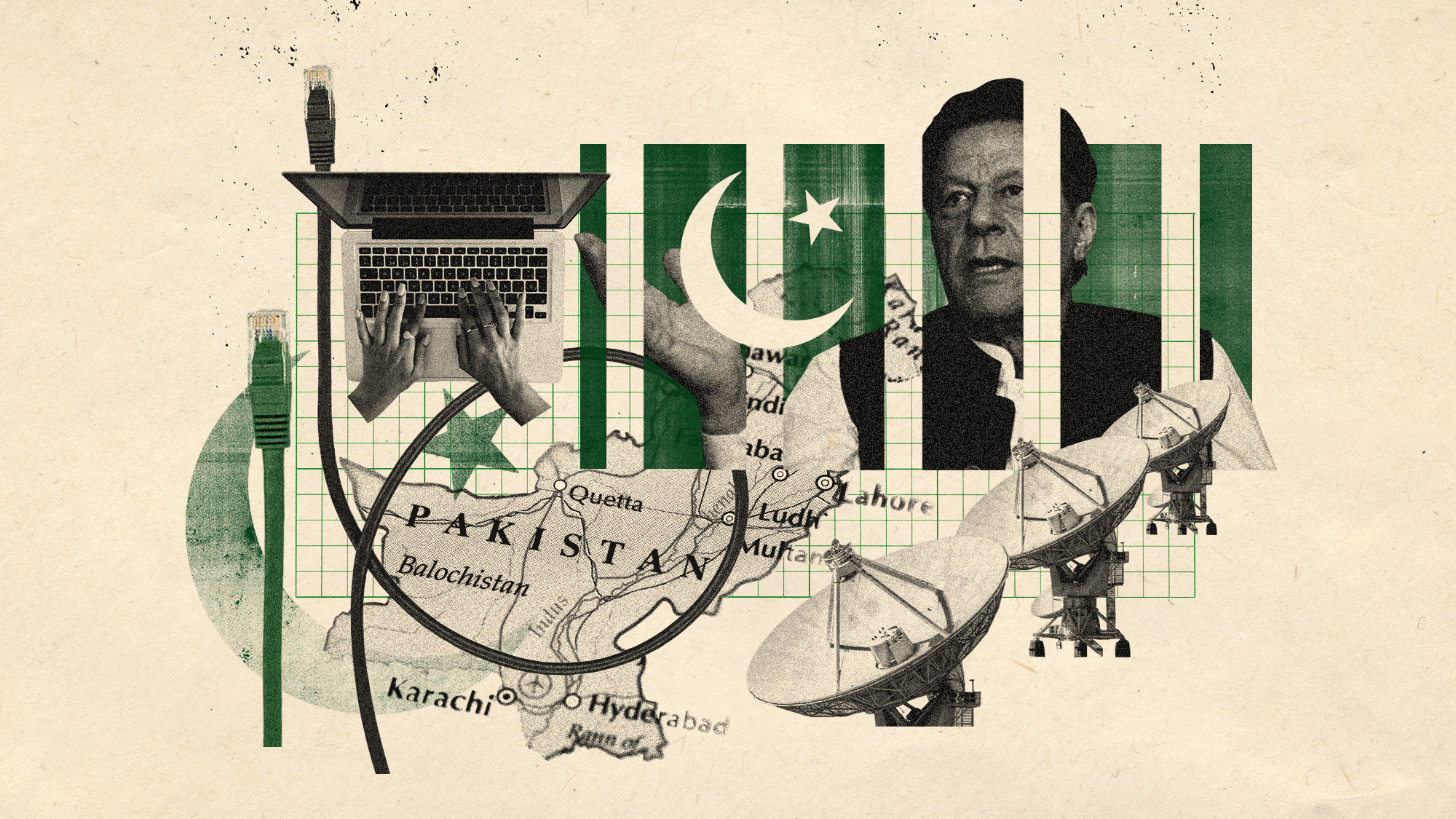Pakistan 'gaslighting' citizens over sudden internet slowdown
Government accused of 'throttling the internet' and spooking businesses with China-style firewall, but minister blames widespread use of VPNs

A free daily email with the biggest news stories of the day – and the best features from TheWeek.com
You are now subscribed
Your newsletter sign-up was successful
The government of Pakistan is "throttling the internet" with a China-style firewall to "crush dissent" – and "gaslighting" citizens about it, activists and business leaders claim.
Internet connectivity has been up to 40% slower than normal since July, according to one IT expert quoted on the Karachi-based online newspaper Dawn, disrupting businesses and affecting millions. For weeks the government "refused to comment". Pakistan's all-powerful military said it was battling so-called "digital terrorism".
But a digital rights specialist blames the installation of a national firewall, aimed at "increasing surveillance and at censoring political dissent", which the government denies. Activists say the "target" of the disruption is the party of jailed opposition leader and former prime minister Imran Khan, who is still "wildly popular and boosted by a young, tech-savvy voter base".
The Week
Escape your echo chamber. Get the facts behind the news, plus analysis from multiple perspectives.

Sign up for The Week's Free Newsletters
From our morning news briefing to a weekly Good News Newsletter, get the best of The Week delivered directly to your inbox.
From our morning news briefing to a weekly Good News Newsletter, get the best of The Week delivered directly to your inbox.
Pakistan's digital censorship playbook
Last week the Pakistan Software Houses Association (P@SHA) described the "hastily" implemented firewall as a "sacrifice" of the nation's IT industry "at the altar of misplaced priorities".
It "triggered a perfect storm of challenges" that threatened a "complete meltdown of business operations", said the group in a press release. It was a "direct and aggressive assault on the industry’s viability". A "mass exodus of IT companies is not just a possibility but an imminent reality if immediate and decisive action is not taken", it warned.
It predicted financial losses of up to $300 million for the economy – about a month's worth of the country's IT exports, said The Register. Whatever Pakistan is doing seems similar to the impact of China's Great Firewall abroad, said the tech website, but different from the domestic impact. Within China, access speeds "remain generally high".
Given Pakistan's "history of censorship", however, it would "hardly be surprising" if it were implementing such a system. Activists have long criticised Pakistan's attempted control of the digital sphere.
A free daily email with the biggest news stories of the day – and the best features from TheWeek.com
The country blocked internet access last year when protests erupted over the arrest of Khan. X (formerly Twitter) has been banned since February due to "security threats", after it was used to share allegations of poll rigging against Khan's party during the election.
Pakistan has also blocked access to Wikipedia and TikTok in recent years, to restrict content deemed "inappropriate on religious grounds".
The government's defence
After "weeks of hue and cry from internet users", the Pakistani government claimed that it was upgrading its "web management system" to combat cybersecurity threats, said The Times of India.
On Sunday, Pakistan's minister for IT and telecommunications denied that the government was responsible for the anaemic speeds. She said claims the government was "throttling the internet to suppress dissent" were "completely false".
The "frequent, unannounced degradations" in connectivity were due to the widespread use of secure connections, or virtual private networks (VPNs), Shaza Fatima Khawaja said.
"I can say under oath that the government neither shut down nor slowed down the internet," she told a press conference in Islamabad. A meeting has been set up with the Pakistan Telecommunication Authority (PTA) this week to "ensure that users in the country do not face similar problems again".
But the Lahore High Court summoned representatives from the government and the PTA to answer for the disruption. Activists have filed a petition before the Islamabad High Court, calling for the internet to be "declared a fundamental right under Pakistan's constitution", said the BBC. The court is due to hear the case on Monday.
After all, if the issue was more people using VPNs, said Dawn, "why was there a need to get the PTA involved?" What are the authorities hoping to achieve? What is the timeline for the rollout of the new system? What can ordinary users expect from it? How can the state expect people to respect restrictions when the state itself uses VPNs to get around them? Even Pakistan's prime minister and other state officials appear to be using VPNs to continue to access and post on X.
There is still "very little" in the way of answers. And it is this "opacity" that keeps people "deeply suspicious". "The people deserve more than clueless representatives gaslighting them for suffering poor internet connectivity."
Harriet Marsden is a senior staff writer and podcast panellist for The Week, covering world news and writing the weekly Global Digest newsletter. Before joining the site in 2023, she was a freelance journalist for seven years, working for The Guardian, The Times and The Independent among others, and regularly appearing on radio shows. In 2021, she was awarded the “journalist-at-large” fellowship by the Local Trust charity, and spent a year travelling independently to some of England’s most deprived areas to write about community activism. She has a master’s in international journalism from City University, and has also worked in Bolivia, Colombia and Spain.